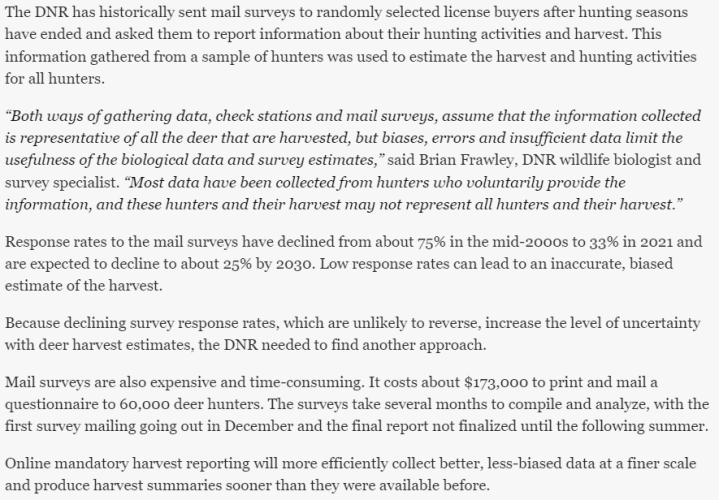Hunting Wife
Well-known member
I think what people are saying is that hunter experience in the ground is not matching up with the data FWP are reporting to an increasing degree and we would like to see that increased precision. In this case yes, it may be worth the cost.What I gathered from the paper, is that mandatory reporting systems can get you a small increase in accuracy/precision but is it worth the extra cost when you’re talking about a couple of percentage points for likely several hundred K? Would you rather see that money go towards research or habitat/access?
FWP is using these, admittedly imprecise “HD level” harvest data to make decisions about altering HDs. I’m not sure that is appropriate given their methods. If they want to make HD-level management decisions, they should be gathering HD level data with as much precision as possible. They aren’t doing that. In my own experience, and others here, they have been pretty loose in how they assign hunters to specific HDs when people aren’t sure where they were. To then argue that their method is superior statistically is kind of disingenuous. Seems to ignore a bias in the way they are collecting harvest data.And this is for general licenses with which FWP does attempt to gather harvest at the HD-scale.
Again, not buying it. They SHOULD be taking all of those things into account when establishing tag numbers, and there are well-established methods in place for doing so. Other states manage to use these methods quite effectively. Neighboring states are routinely able to be much more adaptable and responsive in tailoring tag numbers to reflect population changes due to weather, harvest, disease events etc., even going so far as closing seasons if it’s the best thing for the resource. Yet somehow, Montana has historically been very slow to respond to population slumps, and when they do it’s incremental at best. Why is Montana unwilling or unable to implement the methods other states are using quite effectively?I guess we’ll see what actually occurred when the results come out next spring. Also, are we talking predicting population trajectories, which would take into account production, recruitment, winter, drought, harvest, etc., or just harvest? I think population models are helpful but I also think there are so, so many things you can’t predict when it comes to environmental factors/stochasticity and hunting is just a piece of that. And it is apparently a struggle to just get the hunting/harvest part right.
No method is 100%, that’s why we have statistics. Using less than 100% accuracy as an excuse for not using a method is a cop out.Replying to Doug, one would think that mandatory reporting and its implications mean there is 100% response (I agree it sure as heck should), but this rarely happens (some states don’t even get 80%) and the added effort to re-survey non-responding hunters is costly.
Plus again, the technology for gathering self-reported data has advanced light-years since that paper was written. In that time we’ve switched to 100% online applications, hunt planning tools, purchasing, etc. Put reporting in the app (app technology can do amazing things of properly developed). Put it on the website. Send links in email. Add it to the license purchasing site. Using phone calls or mailings as the primary mode of data collection are obsolete and inefficient IMO. It makes no sense to me how the argument can be made that the current phone surveys are more cost effective than an automated self-reporting method using one of the technologies FWP already has in place. Switching the current phone survey efforts towards calling non-responders of mandatory reporting does not seem that onerous to me.
I’m saying the agency makes the argument that they either have sufficient HD level data, or doesn’t, depending on the questions being asked or the solutions being proposed by the public. Based on the myriad experiences of some very knowledgeable members posted here, as well as things I’ve heard in some of the agency testimony it seems to be a source of circular arguments from the agency, and raises significant questions about the quality and utility of the data they are collecting with their current methods.For Hunting Wife, when you bring up localized scale, are you talking about within HD, or just at an HD scale? Harvest surveys as done provide the data at an HD scale, so I’m not tracking you, sorry. As far as numerous other states finding cost-effective ways to do this, looking back at the volume of MT hunters vs. some other states, is it, though? (Serious question—I’m not familiar with what other states spend outside of what I was given above and what’s in the paper, and what are those state agency professionals saying?).
States with hunting licenses ranging from a fraction of Montana’s numbers to several times Montana’s numbers have implemented mandatory reporting, with many of these being implemented within the last 5-8 years. I don’t have specifics for their budgets, but I can’t imagine they would be adopting this if the cost:benefit was really that bad.
But science-based management should be evolving. That’s why it’s called adaptive management. There seems to be a dearth of similar research, and nothing less than a decade old. Peer reviewed doesn’t mean it’s relevant forever. Technology has changed, management needs have changed, the wishes of the public are changing, priorities change. I would like to see a modern analysis in light of some of the challenges managers are facing currently, and new technologies available. Old methods that don’t answer new questions are not very useful.We as hunters ask for science-based management. This paper, whether you like it or not, was peer-reviewed by specialists in the wildlife field (at a broader level than in MT) and deemed worthy of publication.





